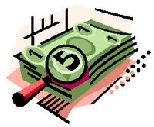
 |
|
| Financial Terms | |
| debit memo |
|
Information about financial, finance, business, accounting, payroll, inventory, investment, money, inventory control, stock trading, financial advisor, tax advisor, credit.
Main Page: stock trading, financial, finance, credit, business, accounting, tax advisor, inventory control, Also see related: real estate, mortgage, condo, buy home, home, insurance, credit, homebuyer, home buyer, |
Definition of debit memo
debit memoA record of the funds which have been debited from your account.
Related Terms:Offering memorandumA document that outlines the terms of securities to be offered in a private placement. Preauthorized electronic debits (PADs)debits to its bank account in advance by the payer. The payer's DebitOne side of a journal entry, usually depicted as the left side. Offering MemorandumA "prosperous-like" document providing detailed descriptions of a company's past, present, and prospective business operations. It is normally prepared for the use of potential purchasers of securities offered under the seed capital or private placement prospectus exemptions. credit memoA record of the funds which have been credited to your account. debitFunds which have been deducted from your account. The opposite of a debit is a credit. debit cardA card which enables you to directly access your bank account when paying for purchases. So instead of paying in cash or with a credit card, a debit card allows the specified amount of the purchase to be electronically debited, or withdrawn, from your bank account. See Interac Direct Payment for an explanation of the actual procedures that you follow at the point of sale (POS) terminal to use your debit card.  Competitive offeringAn offering of securities through competitive bidding. Dual syndicate equity offeringAn international equity placement where the offering is split into two Electronic data interchange (EDI)The exchange of information electronically, directly from one firm's Electronic depository transfersThe transfer of funds between bank accounts through the Automated Initial public offering (IPO)A company's first sale of stock to the public. Securities offered in an IPO are Negotiated offeringAn offering of securities for which the terms, including underwriters' compensation, Preauthorized checks (PACs)hecks that are authorized by the payer in advance and are written either by Primary offeringA firm selling some of its own newly issued shares to investors. Public offeringThe sale of registered securities by the issuer (or the underwriters acting in the interests of the  Reoffering yieldIn a purchase and sale, the yield to maturity at which the underwriter offers to sell the bonds Rights offeringIssuance of "rights" to current shareholders allowing them to purchase additional shares, e-commerce (electronic commerce)any business activity that uses the Internet and World Wide Web to engage in financial transactions electronic data interchange (EDI)the computer-to-computer transfer of information in virtual real time using standardized formats developed by the American National Standards Institute Public offeringThe sale of new securities to the investing public. initial public offering (IPO)First offering of stock to the general public. seasoned offeringSale of securities by a firm that is already publicly traded. Electronic Federal Tax Payment Systems (EFTPS)An electronic funds transfer system used by businesses to remit taxes to the government. Initial Public OfferingA firms first offering of its shares to the investment public, after registration requirements of the various securities regulators have been met. EFT (electronic funds transfer)Funds which are electronically credited to your account (e.g. direct deposit), or electronically debited from your account on an ongoing basis (e.g. a pre-authorized monthly bill payment, or a monthly loan or mortgage payment). A wire transfer is a form of EFT. Related to : financial, finance, business, accounting, payroll, inventory, investment, money, inventory control, stock trading, financial advisor, tax advisor, credit. |